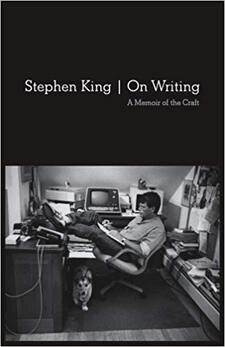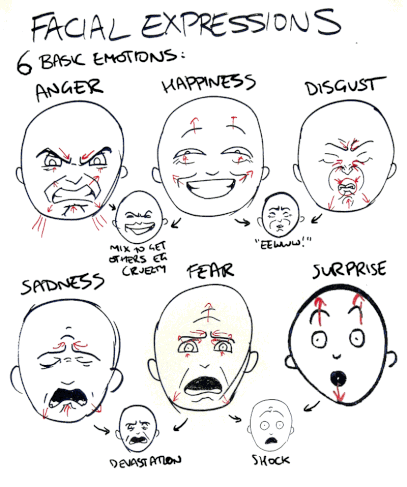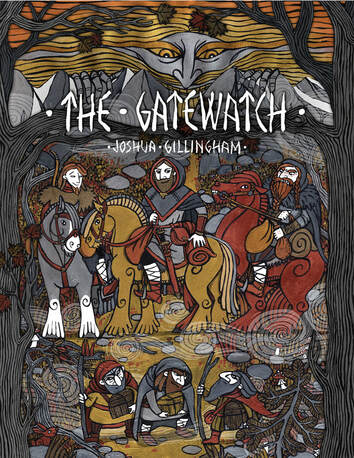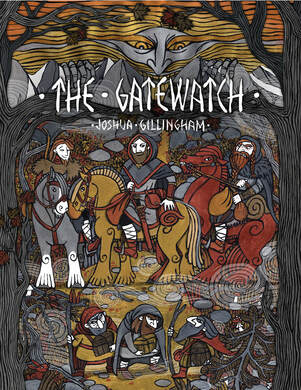|
Early into the first draft of The Gatewatch I had a minor crisis of identity. Who was I to assume that I could write a book worth reading and did I recall enough proper grammar to pass for a 'real' writer? To quell my doubts I began devouring writing advice by respected authors while I pressed on with the story. Who was I to assume that I could write a book worth reading I first reread an excellent essay I encountered in university, George Orwell's Politics and the English Language. His pointed message renewed my determination to pursue and eliminate pretentious diction, meaningless words, and dying metaphors. As a writer of fantasy, a genre too often plagued by these particular issues, I found it necessary to thoroughly purge what I had written in my rough draft before proceeding with the story.
While discussing dialogue, Stephen King suggests that descriptors such as shouted, whispered, screamed, roared, wailed, moaned, and whimpered should be used extremely sparingly, if at all. Even worse are phrases like whispered quietly, screamed furiously, or moaned woefully. The reason, of course, is that if you have not made clear from the context of the conversation what the tone of the dialogue is then using a phrase like ‘he shouted angrily' is profanely lazy. King suggests instead that writers invest more energy describing their red-faced, tight-fisted, jaw-clenched characters leading up to the dialogue so that readers can infer their tone from context alone. Stephen King suggests that descriptors such as shouted, whispered, screamed, roared, wailed, I took this advice literally and removed any word for dialogue besides said from my rough draft. Though I meant it to be more of a writing exercise than a rule I soon found that my scenes pulsed with an energy that they lacked before. I swore from then on never to use a phrase such as 'he shouted angrily' or 'she whispered tenderly' and to this day I have not used any attribution other than said. I swore from then on never to use a phrase such as 'he shouted angrily' or 'she whispered tenderly' For anyone willing to accept the challenge of using only said for dialogue I feel compelled to offer some support. One area of knowledge that I had a decent intuition about but failed to study closely before adopting this rule was the science of body language. Facial expressions and body posture can do more to communicate a character’s state of mind than a paragraph stuffed full of emotive descriptors. Ekman's Six Basic Emotions (Credit: Adam Murphy) These traits are so consistent that psychologist Paul Ekman categorized expressive facial movements into six basic emotions: anger, disgust, fear, happiness, sadness, and surprise. These expressions are performed unconsciously and are nearly universal. I believe as writers we can reverse-engineer this categorization to craft physical descriptions that are organic and intuitive for readers to interpret. I believe as writers we can reverse-engineer this categorization to craft physical descriptions For example, in a scene of courtly intrigue one might expect a line such as this: “Damned fool,” Darius snarled disgustedly. I hope you will agree that this line is particularly awful. The word snarled falls flat as it is a gross exaggeration; animals snarl but people do not. It is also confusing as a snarl is an expression of aggression in animals, not of disgust. As if all this was not enough to push this line into irredeemable mediocrity, the use of the word disgustedly shows that the author had neither the time nor the energy to show how Darius felt but instead cut a quick corner by stating it directly. The word 'snarled' falls flat as it is a gross exaggeration; animals snarl but people do not. It is also confusing as a snarl is an expression of aggression in animals, not of disgust. To rework this line I would first identify the basic emotion that the character is experiencing, in this case disgust. Disgust has been identified as one of the six basic emotions and is characterized by distinct positioning of the eyebrows, nose, and mouth. By utilizing these facts we could, perhaps, redeem the line as follows: Darius furled his brow and wrinkled his nose. “Damned fool,” he said. In this case the word used for dialogue attribution is not hijacked to reveal Darius’ state of mind; it simply does its job of identifying who is speaking. In fact, the actual word disgust does not appear in the text at all. Through the description of Darius’ face and our own experience with facial gestures we, as readers, know exactly how Darius is feeling without being whomped over the head with a direct description. Our imagination is allowed to fill in the emotional context, and that is a far more powerful tool than words on a page. In this case the word used for dialogue attribution is not hijacked to reveal Darius’ state of mind; Further, we can easily adjust this line to convey other emotions by altering Darius’ facial expressions. If instead of wrinkling his nose Darius flared his nostrils we would know that he is feeling anger (another one of the six basic emotions) instead of disgust. Again, if he had opened his mouth and raised his eyebrows we would infer that he is surprised instead of angry or disgusted. If instead of wrinkling his nose Darius flared his nostrils we would know that he is feeling anger Though it is sometimes necessary to use said to identify the speaker I would refine the line one step further by eliminating the dialogue attribution altogether and communicating the source of these words through their position on the page like this: Darius furled his brow and wrinkled his nose. “Damned fool.” Though some might disagree with this last step, I have taken to doing this whenever possible. By avoiding dialogue attributions other than said, and even using said only when necessary, I have been able to craft lively dialogue between characters that is not hindered or burdened by unnecessary descriptors. In other words, some things really are better left (un)said. For sage advice on the craft of writing Joshua recommends Stephen King's On Writing: A Memoir of the Craft.
0 Comments
The advice I gave in Part I of Becoming a Resilient Writer went down pretty easy, maybe not ‘strawberry milkshake’ easy but certainly ‘spinach smoothie’ easy. Part II is full of suggestions that most will find about as palatable as shooting apple-cider vinegar straight. However, as a beneficiary of honest writing advice myself I feel compelled to pass these lessons on. "Clearly the message of resilience resonated with the wider writing community. " The first lesson on the second stage of my writing journey is this: view rejection as a personal victory. I am not kidding when I tell you that I literally jumped out of my chair and did a double fist-pump in the air when the notification of my first rejection popped up on my phone. I was elated. Why? Because I was rejected by a big publisher. That means they had considered it. For three seconds, three pages, or thirty minutes, it didn’t matter. And believe me when I say it was not the last rejection I received. If I had let those rejections knock me down a notch I’d be far enough underground to hit the water table by now. Whatever I felt, whether it was excitement, frustration, or fear, I threw into the tank as fuel to send out another query, to reach out to another author, or to push through another edit of my manuscript. So don’t let rejection burn you down; use it as rocket fuel instead and eventually you will achieve lift-off. "So don’t let rejection burn you down; use it as rocket fuel instead and eventually you will achieve lift-off. "
"That twenty five minutes which should have been spent crafting the final climactic scene will be squandered scrolling through the responses (or a depressing lack thereof) on your feed. Instances become patterns. Patterns become habits." The third piece of advice I have for writers who aspire to publish their work is this: start networking early and pay it forward whenever you can. There is an incredibly diverse and active community of writers, published and unpublished, who are working their fingers into nubby little stumps trying to get their next book finished and released. Recognize that the rush you get from someone sharing a post about your novel or commenting on an interview you were in is something of value that you can pass on to other people. Here’s the best part: it only costs you a bit of time and energy. And while some might say that time spent connecting with and encouraging other authors should be spent writing, your future publisher might disagree. After all, writing a book is only the beginning; your future publisher is part of the publishing industry and that means selling books. The professional support network you build will be instrumental in getting your book into the hands of fans all over the world. So do unto others as you’d hope they would do to you: send encouraging notes, cheer on their successes, and invest in your own community of author friends, publishing contacts, and future fans. "And while some might say that time spent connecting with and encouraging other authors should be spent writing, As I said in Becoming a Resilient Writer (Part I), not everything that works for me will work for you. But the creative potential within you will not be fully realized if you don’t have the resiliency to see your projects through. Stand firm, forge ahead, and write the story you were born to tell. For more on writing and resiliency Joshua suggests reading Steven Pressfield’s The War of Art.
"as the northern realm of Noros came into clearer view and the main characters delved The three main characters, Torin, Bryn, and Grimsa, are inspired by the three central figures of Norse Mythology: Odin, Loki, and Thor. Other characters throughout the book reflect familiar Norse personalities in a much looser sense: Freya, Frigg, Heimdal, and the dwarven brothers Brokk & Eitri to name a few. Certain events, such as a drinking contest in an enormous mead hall, are directly based on specific myths, in that case Thor’s Journey to Utgard. Torin’s obsession with riddles (part of his Odin-like nature) culminates in a duel of riddles to the death with a giant king; this is inspired by scenes from The Saga of Hervör and Heidrek and from Vafþrúðnismál in the Poetic Edda. The epic poems recited in the book are structured around some of the poetic rules of drottkvaett, the ancient court meter of viking skalds; further, many treasure and place names are direct or close translations of Old Norse words. And, of course, the entire book centers around defending the human realm against giants and trolls which is a classic heroic task of both Norse gods and Viking heroes. "the entire book centers around defending the human realm against giants and trolls
"any readers who have had the pleasure of bathing in Iceland’s Blue Lagoon will recognize its influence on the underground baths visited by the characters in Gatewatch" Distinctly lacking in The Gatewatch are Viking longships and the northern sea because the story takes place high up in the mountains. This, of course, will be remedied in future sequels, the first of which is already well underway. For now, find the first three chapters on the website and stay up to date on publication details and future novels by joining The Gatewatch mailing list.
|
AuthorJoshua Gillingham is an author, editor, and game designer from Vancouver Island, Canada. Archives
April 2022
Categories
All
|








 RSS Feed
RSS Feed
